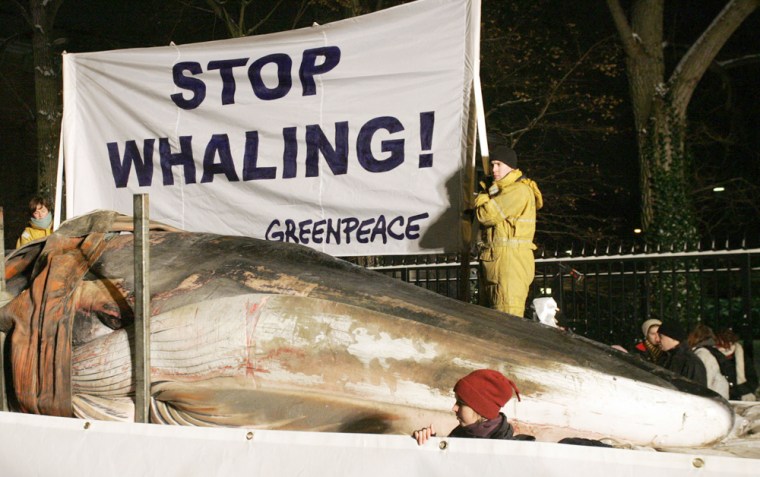Greenpeace activists parked a 20-ton dead whale outside the Japanese embassy in Berlin on Thursday to protest against the country’s whaling program.
Hundreds of people gathered to catch a glimpse of the 56-foot-long fin whale, which the group transported by trailer to the German capital late Wednesday.
“This fin whale is one of the most endangered species in the world and Japan still hunts them,” said Greenpeace spokeswoman Stefanie Werner. “It must stop.”
Greenpeace said it hoped the whale’s presence would demonstrate to Japan the futility of its whaling program, which has caused controversy for nearly 20 years.
A spokesman for the Japanese embassy in Berlin said it regretted Greenpeace’s move, adding the country’s whaling activities were carried out in accordance with international agreements.
Found stranded on Germany’s Baltic coast last week, the dead fin whale was to be sent back there for an autopsy later on Thursday.
Rare sight for Berliners
“You don’t get whales coming to Berlin too often,” said Berlin police spokesman Bernhard Schodrowski.
Japan abandoned commercial whaling in 1986, in line with an international moratorium, but began catching whales again the following year for what it calls scientific research. Critics say the whale meat goes to upmarket Japanese restaurants.
Japan last June announced plans to double its annual catch of minke whales to 850. It also has a quota of 10 fin whales, the second biggest member of the family after the massive blues.
Greenpeace, which has two ships tracking the Japanese whaling fleet currently in Antarctic waters, told Reuters on Thursday that it believes Japanese hunters had killed at least 123 whales since the start of the whaling season, adding that its activists had managed to disrupt several hunts.
Whale sanctuary cited
Greenpeace expedition leader Shane Rattenbury said the group was targeting this particular hunt because Japan had decided to double its quota of minke whales and because the area was considered to be a sanctuary. Iceland and Norway also hunt whales.
“This is supposed to be a whale sanctuary and the Japanese government is the only one in the world which is defying the ban on whaling here,” Rattenbury said.
Last Saturday, a Greenpeace activist was flung into the freezing sea when the line attached to the harpoon fell across his inflatable boat. He was later picked up unharmed.
During the previous weekend, Japanese and Greenpeace ships collided, causing minor damage. Each side blamed the other.
Earlier this week, 17 countries, including Australia, Brazil, Britain, France and Germany, jointly called on Japan to put a stop to its Antarctic whaling program. The United States also opposes the program.
